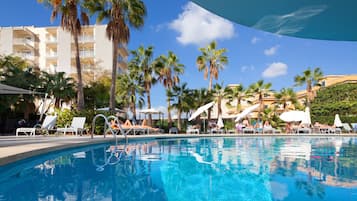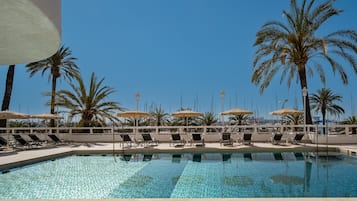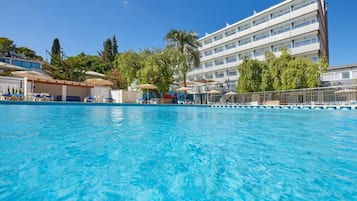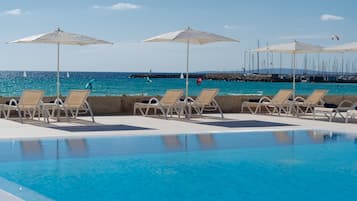The best historic things to discover in Mallorca highlight the island’s intriguing past, which goes as far back as the Neolithic period. Over the centuries, it’s been inhabited by the Phoenicians, Romans, Muslims, and Byzantines.
Mallorca is particularly famous for talaiot or talayots, which are prehistoric megaliths of the Bronze Age. There’s even an archaeological museum dedicated to one of the complete Talaiotic settlements in the Balearic Islands. Beautiful Spanish and Gothic architecture are also must-sees on the island, especially in the city of Palma. You’ll feel as if you’ve stepped back into Mallorca’s past when visiting these major landmarks.
- 1
Catedral-Basílica de Santa María de Mallorca
An ornate Roman Catholic church in Palma
- Budget
- Geschichte
- Foto
Mehr anzeigenCatedral-Basílica de Santa María de Mallorca towers above the city of Palma, serving as one of the most recognisable landmarks in Mallorca. The ornate, sandstone building overlooks both Palma Old Town and the Mediterranean Sea.
The Roman Catholic cathedral, also known as La Seu or Palma Cathedral, was built during the reign of King James I of Aragon in 1229. It has over 60 stained-glass windows, including a central rose window above the main entrance. Another standout feature of the church is its ornamental wrought-iron baldachin, designed by Antoni Gaudí in 1901.
Lage: Plaça de la Seu, s/n, 07001 Palma, Illes Balears, Spain
Öffnungszeiten: Monday–Saturday from 10 am to 2.15 pm (closed on Sundays)
Telefon: +34 (0)971 71 31 33
Karte - 2
Bellver Castle
A 14th-century royal fortress overlooking Palma Bay
- Paare
- Geschichte
- Foto
Mehr anzeigenBellver Castle (Castell de Bellver) is a circular Gothic structure on a hill close to the city of Palma. Built in the 14th century, this formidable royal fortress has a central courtyard surrounded by 3 towers. It’s one of the few circular castles in Europe, with expansive views of Mallorca and Palma Bay.
Bellver Castle also houses the Palma Museum of Municipal History, which showcases artefacts from the Roman, Arab, and Spanish periods of the island’s history. Classical music by the Balearic Symphony Orchestra takes place at the castle every summer, usually in July.
Lage: Carrer de Camilo José Cela, 07014, Palma, Illes Balears, Spain
Öffnungszeiten: April–September: Tuesday–Saturday from 10 am to 7 pm, Sunday from 10 am to 3 pm. October–March: Tuesday–Saturday from 10 am to 6 pm, Sunday from 10 am to 3 pm (closed on Mondays)
Telefon: +34 (0)971 73 50 65
Karte - 3
Royal Palace of La Almudaina
The official residence of Spanish royalty in Mallorca
- Geschichte
- Foto
Mehr anzeigenThe Royal Palace of La Almudaina (Palau Reial de l'Almudaina) is an impressive landmark next to the Palma Cathedral in Mallorca. The complex serves as the official residence of the King and Queen of Spain, as well as the venue for royal ceremonies on the island.
The castle is open for public viewing, so you can explore its many opulent rooms and courtyards. The Capilla de Santa Ana is a Gothic Romanesque-style chapel with a Pyrenean marble portal – one of the few remaining designs in Mallorca. During summer, you can visit the Royal Palace of La Almudaina for free on Wednesday and Sunday evenings.
Lage: Carrer del Palau Reial, s/n, 07001 Palma, Illes Balears, Spain
Öffnungszeiten: Summer: Tuesday–Sunday from 10 am to 7 pm. Winter: Tuesday–Friday from 10 am to 4 pm, Saturday–Sunday from 10 am to 6 pm
Telefon: +34 (0)902 04 44 54
Karte - 4
Sanctuary of Sant Salvador
Hilltop monastery and viewpoint in Felanitx
- Abenteuer
- Budget
- Geschichte
- Foto
Mehr anzeigenThe Sanctuary of Sant Salvador is a 14th-century monastery on the summit of Puig de Sant Salvador, which sits 509 metres above sea level. Inside, you can find a Gothic 15th-century altarpiece and religious paintings. Pilgrims often come here to leave offerings to La Mare de Déu de la Salut and the Virgin Mary.
Known locally as Santuari de la Mare de Déu de Sant Salvador, the monastery is flanked by a couple of monuments – a 14-metre-tall stone cross and a sculpture of Christ standing atop a 37-metre-high platform. The Sanctuary of Sant Salvador is around 8 km southeast of Felanitx. The winding road leading to the summit is very popular among experienced cyclists.
Lage: Crta. de, Ctra. Porto Colom, s/n, 07200 Felanitx, Illes Balears, Spain
Telefon: +34 (0)971 82 72 82
Karte - 5
Basílica de San Francisco
Visit the tomb of Ramon Llull, an important figure in Mallorca’s history

- Budget
- Geschichte
- Foto
The Basílica de San Francisco is a 13th-century Roman Catholic church in Palma Old Town. It’s one of Mallorca’s best historic buildings, thanks to its intricate gothic cloister and baroque sandstone facade. Here, you can check out statues and artwork telling the story of the island's iconic figures, relax in the serene courtyard, and simply take in the grand structure.
The Basílica de San Francisco’s vaulted ceiling features stonework and sculptures dating back to the 14th century. Wall carvings showcase notable events, such as the massacre of 19 Catholics in Holland in 1572. You can also visit the tomb of Ramon Llull, a philosopher and poet who was stoned to death in 1315 for attempting to convert Muslims in Tunisia.
Lage: Plaça de Sant Francesc, 7, 07001 Palma, Illes Balears, Spain
Öffnungszeiten: Monday–Saturday from 9.30 am to 12.30 pm and from 3 pm to 8 pm, Sunday from 9 am to 12.30 pm
Telefon: +34 (0)971 71 26 95
Karte - 6
Carthusian Monastery Valldemossa
The winter residence of Frédéric Chopin

- Geschichte
- Foto
The Carthusian Monastery Valldemossa was built in the 14th century as a royal residence and was later turned into a monastery. The building, also known as Valldemossa Charterhouse, lies within the Tramuntana Mountains. It was the winter home of famous composer Frédéric Chopin between 1838 and 1839.
When you visit, you can roam through the gardens, explore the library, and enjoy panoramic views of Mallorca from the terraces. If you’re lucky, you may even catch a piano concert performance of Chopin’s most famous compositions.
Lage: Plaça Cartoixa, S/N, 07170 Valldemossa, Illes Balears, Spain
Öffnungszeiten: Monday–Saturday from 10 am to 4.30 pm (closed on Sundays)
Telefon: +34 (0)971 61 21 06
Karte - 7
Castell de Capdepera
A well-preserved fortress on the northeast coast of Mallorca
- Geschichte
- Foto
Mehr anzeigenThe Castell de Capdepera is a medieval fortress on Puig de Capdepera, a 159-metre-high hill on Mallorca’s northeast coast. It was built in the 14th century during the reign of King James II of Aragon. Today, it's a historic landmark where you can enjoy expansive views of the Minorca Channel and the Mediterranean Sea.
Every May, the Castell de Capdepera hosts a medieval festival to celebrate the founding of Capdepera. The fortress is open year-round, and you’ll need to climb around 150 steps to reach the summit.
Lage: Carrer Castell, s/n, 07580 Capdepera, Illes Balears, Spain
Telefon: +34 (0)971 81 87 46
Karte - 8
Santuari de Lluc
A notable pilgrimage site in Escorca

- Geschichte
- Foto
Santuari de Lluc is a 13th-century monastery in Escorca, on the west coast of Mallorca. This prominent pilgrimage site also serves as a museum, where you can see weapons, ceramics, and artefacts from the Talaiotic Period.
A unique part of Santuari de Lluc is that it’s a working hotel containing several rooms with en-suite bathrooms, as well as an onsite restaurant. The Església de Llluc is the monastery's chapel, which was consecrated in 1691. Inside, you can see a statue of Catherine of Palma, the patron saint of Mallorca.
Lage: Plaza Pelegrins, 1, 07315 Lluc, Balearic Islands, Spain
Telefon: +34 (0)971 87 15 25
Karte - 9
Artà Regional Museum
Learn about the city’s natural history and archelogy

- Geschichte
- Foto
Artà Regional Museum (Museu Regional d'Artà) preserves the town’s heritage through interesting exhibits on natural history, archaeology, and ethnology. This rather compact museum is just a short walk from the Ajuntament d'Artà city hall.
Founded in 1927, the museum’s collection is divided into several galleries. You can see 250 stuffed birds from 120 species, ceramics and jewellery from the Bronze Age, Talayotic and Punic periods, as well as local plants donated by Llorenç Garcías Font. There are also rotating exhibitions of local art and culture.
Lage: Carrer de L'Estel, 4, 07570 Artà, Balearic Islands, Spain
Öffnungszeiten: Tuesday–Saturday from 9 am to 2 pm (closed on Sundays and Mondays)
Telefon: +34 (0)971 82 97 78
KarteFoto von Frank Vincentz (CC BY 3.0) bearbeitet
- 10
Archaeological Museum of Son Fornés
Check out ancient artefacts from over 2,000 years ago

- Familien
- Geschichte
- Foto
The Archaeological Museum of Son Fornés displays artefacts excavated from one of the complete Talaiotic settlements in Mallorca. The museum occupies an 18th-century flour mill in the small town of Montuïri, about 33 km east of Palma.
The permanent exhibition showcases the results of excavations that took place in Son Fornés between 1975 and 1988. You can see ancient weapons, tools, and coins dating back to the 10th century BC. The archaeological site is just 2.4 km northwest of the museum. The Archaeological Museum of Son Fornés opens on weekdays as well as on the last Sunday of the month – you can enjoy free entry on that day.
Lage: Carrer Emili Pou, 07220 Montuïri, Illes Balears, Spain
Öffnungszeiten: Monday–Friday from 10 am to 2 pm (closed on Saturdays and Sundays)
Telefon: +34 (0)971 64 41 69
Karte
























